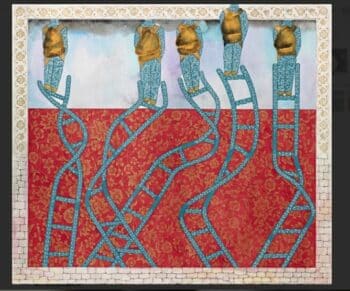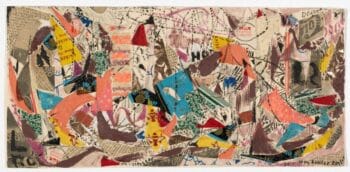Dear friends,
Greetings from the desk of Tricontinental: Institute for Social Research.

Tadasu Takamine (Japan), Still frame from: ‘God Bless America’, 2002.
During the May 2023 Group of Seven (G7) summit, the leaders of Canada, France, Germany, Italy, Japan, the United Kingdom, and the United States visited the Hiroshima Peace Memorial Museum, near where the meeting was held. Not doing so would have been an act of immense discourtesy. Despite many calls for an apology from the U.S. for dropping an atomic bomb on a civilian population in 1945, U.S. President Joe Biden has demurred. Instead, he wrote in the Peace Memorial guest book: ‘May the stories of this museum remind us all of our obligations to build a future of peace’.
Apologies, amplified by the tensions of our time, take on interesting sociological and political roles. An apology would suggest that the 1945 bombings of Hiroshima and Nagasaki were wrong and that the U.S. did not end their war against Japan by taking the moral high ground. An apology would also contradict the US’s decision, backed fully by other Western powers over 70 years later, to maintain a military presence along the Asian coastline of the Pacific Ocean (a presence built on the back of the 1945 atomic bombings) and to use that military force to threaten China with weapons of mass destruction amassed in bases and ships close to China’s territorial waters. It is impossible to imagine a ‘future of peace’ if the U.S. continues to maintain its aggressive military structure that runs from Japan to Australia, with the express intent of disciplining China.

Kent Monkman (Canada), The Scream, 2017.
UK Prime Minister Rishi Sunak was given the errand to warn China about its ‘economic coercion’ as he unveiled the G7 Coordination Platform on Economic Coercion to track Chinese commercial activities. ‘The platform will address the growing and pernicious use of coercive economic measures to interfere in the sovereign affairs of other states’, Sunak said. This bizarre language displayed neither self-awareness of the West’s long history of brutal colonialism nor an acknowledgement of neocolonial structures—including the permanent state of indebtedness enforced by the International Monetary Fund (IMF)—that are coercive by definition. Nonetheless, Sunak, Biden, and the others preened with self-righteous certainty that their moral standing remains intact and that they hold the right to attack China for its trade agreements. These leaders suggest that it is perfectly acceptable for the IMF—on behalf of the G7 states—to demand ‘conditionalities’ from debt-ridden countries while forbidding China from negotiating when it lends money.
Interestingly, the final statement from the G7 did not mention China by name, but merely echoed the concern about ‘economic coercion’. The phrase ‘all countries’ and not China, specifically, signals a lack of unity within the group. European Commission President Ursula von der Leyen, for instance, used her speech at the G7 to put the U.S. on notice for its use of industrial subsidies: ‘We need to provide a clear, predictable business environment to our clean tech industries. The starting point is transparency among the G7 on how we support manufacturing’.

Francesco Clemente (Italy), Sixteen Amulets for the Road (XII), 2012—2013.
One complaint from Western governments and think tanks alike has been that Chinese development loans contain ‘no Paris Club’ clauses. The Paris Club is a body of official bilateral creditors that was set up in 1956 to provide financing to poor countries who have been vetted by IMF processes, stipulating that they must pledge to conduct a range of political and economic reforms in order to secure any funds. In recent years, the amount of loans given through the Paris Club has declined, although the body’s influence and the esteem its strict rules garner remain. Many Chinese loans—particularly through the Belt and Road Initiative—refuse to adopt Paris Club clauses, since, as Professor Huang Meibo and Niu Dongfang argue, it would sneak IMF-Paris Club conditionalities into loan agreements. ‘All countries’, they write, ‘should respect the right of other countries to make their own choices, instead of taking the rules of the Paris Club as universal norms that must be observed by all’. The allegation of ‘economic coercion’ does not hold if the evidence points to Chinese lenders refusing to impose Paris Club clauses.
G7 leaders stand before the cameras pretending to be world representatives whose views are the views of all of humanity. Remarkably, G7 countries only contain 10 per cent of the world’s population while their combined Gross Domestic Product (GDP) is merely 27 per cent of global GDP. These are demographically and increasingly economically marginalised states that want to use their authority, partly derived from their military power, to control the world order. Such a small section of the human population should not be allowed to speak for all of us, since their experiences and interests are neither universal nor can they be trusted to set aside their own parochial goals in favour of humanity’s needs.
Indeed, the agenda of the G7 was plainly laid out at its origin, first as the Library Group in March 1973 and then at the first G7 summit in France in November 1975. The Library Group was created by U.S. Treasury Secretary George Schultz, who brought together finance ministers from France (Valéry Giscard d’Estaing), West Germany (Helmut Schmidt), and the UK (Anthony Barber) to hold private consultations among the Atlantic allies. At the Château de Rambouillet in 1975, the G7 met in the context of the ‘oil weapon’ wielded by the Organisation for Petroleum Exporting Countries (OPEC) in 1973 and the passage of the New International Economic Order (NIEO) in the United Nations in 1974. Schmidt, who was appointed German chancellor a year after the Library Group’s formation, reflected on these developments: ‘It is desirable to explicitly state, for public opinion, that the present world recession is not a particularly favourable occasion to work out a new economic order along the lines of certain UN documents’. Schmidt wanted to end ‘international dirigisme’ and states’ ability to exercise their economic sovereignty.

Elisabeth Tomalin (UK), Head, ca. 1920
The NIEO had to be stopped in its tracks, Schmidt said, because to leave decisions about the world economy ‘to officials somewhere in Africa or some Asian capital is not a good idea’. Rather than allow African and Asian leaders a say in important global matters, UK Prime Minister Harold Wilson suggested that it would be better for serious decisions to be made by ‘the sort of people sitting around this table’.
The private attitudes displayed by Schmidt and Wilson continue to this day, despite dramatic changes in the world order. In the first decade of the 2000s, the U.S.—which had begun to see itself as an unrivalled world power—overreached militarily in its War on Terror and economically with its unregulated banking system. The war on Iraq (2003) and the credit crunch (2007) threatened the vitality of the U.S.-managed world order. During the darkest days of the credit crisis, G8 states, which then included Russia, asked surplus-holding countries of the Global South (particularly, China, India, and Indonesia) to come to their aid. In January 2008, at a meeting in New Delhi (India), French President Nicolas Sarkozy told business leaders, ‘At the G8 summit, eight countries meet for two and a half days and on the third day invite five developing nations—Brazil, China, India, Mexico, and South Africa—for discussions over lunch. This is [an] injustice to [the] 2.5 billion inhabitants of these nations. Why this third-grade treatment to them? I want that the next G8 summit be converted into a G13 summit’.
There was talk during this period of weakness in the West that the G7 would be shut down and that the G20, which held its first summit in 2008 in Washington, D.C., would become its successor. Sarkozy’s statements in Delhi made headlines, but not policy. In a more private—and truthful—assessment in October 2010, former French Prime Minister Michel Rocard told U.S. Ambassador to France Craig R. Stapleton, ‘We need a vehicle where we can find solutions for these challenges [the growth of China and India] together—so when these monsters arrive in 10 years, we will be able to deal with them’.
The ‘monsters’ are now at the gate, and the U.S. has assembled its available economic, diplomatic, and military arsenals, including the G7, to suffocate them. The G7 is an undemocratic body that uses its historical power to impose its narrow interests on a world that is in the grip of a range of more pressing dilemmas. It is time to shut down the G7, or at least prevent it from enforcing its will on the international order.

Louise Rösler (Germany), Street, 1951.
In his radio address on 9 August 1945, U.S. President Harry Truman said: ‘The world will note that the first atomic bomb was dropped on Hiroshima, a military base. That was because we wished in this first attack to avoid, insofar as possible, the killing of civilians’. In reality, Hiroshima was not a ‘military base’: it was what U.S. Secretary of War Henry Stimson called a ‘virgin target’, a place that had escaped the U.S. firebombing of Japan so that it could be a worthwhile testing ground for the atomic bomb. In his diary, Stimson recorded a conversation with Truman in June about the reasoning behind targeting this city. When he told Truman that he was ‘a little fearful that before we could get ready the Air Force might have Japan so thoroughly bombed out that the new weapon [the atomic bomb] would not have a fair background to show its strength’, the president ‘laughed and said he understood’.
Two-year-old Sadako Sasaki was one of 350,000 people living in Hiroshima at the time of the bombings. She died ten years later from cancers associated with radiation exposure from the bomb. The Turkish poet Nazim Hikmet was moved by her story and wrote a poem against war and confrontation. Hikmet’s words should be a warning even now to Biden for laughing at the possibility of renewed military conflict against China:
Fabienne Verdier (France), Branches et Bourgeons, ‘étude végétal’ (‘Branches and Buds, “Nature Study”’), 2010.
I come and stand at every door
But none can hear my silent tread
I knock and yet remain unseen
For I am dead for I am dead.I’m only seven though I died
In Hiroshima long ago
I’m seven now as I was then
When children die they do not grow.My hair was scorched by swirling flame
My eyes grew dim my eyes grew blind
Death came and turned my bones to dust
And that was scattered by the wind.I need no fruit I need no rice
I need no sweets nor even bread
I ask for nothing for myself
For I am dead for I am dead.All that I need is that for peace
You fight today you fight today
So that the children of this world
Can live and grow and laugh and play.
Warmly,
Vijay


